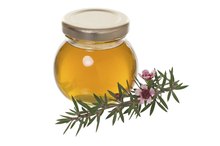The Side Effects of Truvia
Most of us could stand to limit the sweets -- cakes, cookies, pies, doughnuts and other sweet confections are the No. 1 source of calories in the American diet, according to the 2010 Dietary Guidelines. This sweet tooth may be contributing to the obesity epidemic, making foods like zero-calorie sugar substitute Truvia an attractive alternative.
What's in Truvia?
The makers of Truvia say that it is a natural sweetener because it contains stevia, which is a substance from a plant native to Paraguay that is 100 to 300 times sweeter than table sugar. In addition to stevia, Truvia also contains erythritol, a sugar alcohol that adds both sweetness and bulk to the sugar substitute, according to the Truvia website. Truvia also contains "natural flavors," which are flavor enhancers that may or may not be natural, according to Columbia Health.
Side Effects of Erythritol
Stevia Leaf Powder Vs. Leaf Extract
Learn More
Most of the side effects related to Truvia are likely due to its erythritol content, which is the largest ingredient in Truvia Natural Sweetener by weight, and is used as an ingredient to provide bulk and texture. Erythritol is found naturally in a variety of fruits, such as grapes and pears, as well as in mushrooms, and certain fermented foods such as soy sauce and wine.
Poor digestion of sugar alcohol may cause abdominal pain, gas, bloating and diarrhea. However, erythritol is better tolerated than most sugar alcohols, according to the Calorie Control Council, because it is absorbed and eliminated quickly from the body.
- Most of the side effects related to Truvia are likely due to its erythritol content, which is the largest ingredient in Truvia Natural Sweetener by weight, and is used as an ingredient to provide bulk and texture.
- However, erythritol is better tolerated than most sugar alcohols, according to the Calorie Control Council, because it is absorbed and eliminated quickly from the body.
Side Effects of Stevia
The type of stevia you'll find in the market comes in the form of a highly-purified extract, which has been generally recognized as safe by the Food and Drug Administration. Other forms of stevia -- crude extracts or whole-leaf -- have not been approved by the FDA.
Pros and Cons of Truvia
The Side Effects of Sucrose
Learn More
The ingredients found in Truvia are considered safe. If you're experiencing any side effects after ingesting Truvia, you may want to consider not adding it to your food and finding an alternative sweetener. The Academy of Nutrition and Dietetics says that sugar substitutes such as Truvia are beneficial to those trying to limit their calorie intake or manage their weight. They are also helpful for adults with diabetes trying to gain control over their blood sugars. If you're pregnant, you should use Truvia and other sugar substitutes in moderate amounts, says AND but avoid saccharin and aspartame.
- The ingredients found in Truvia are considered safe.
- If you're pregnant, you should use Truvia and other sugar substitutes in moderate amounts, says AND but avoid saccharin and aspartame.
Related Articles
References
- Dietitian Cassie: The Truth About Truvia
- NYU Langone Medical Center: Stevia
- Truvia: About Truvia
- Academy of Nutrition and Dietetics: The Truth About Artificial Sweeteners or Sugar Substitutes
- Ashwell M. Stevia, Nature's Zero-Calorie Sustainable Sweetener: A New Player in the Fight Against Obesity. Nutr Today. 2015;50(3):129-134. doi:10.1097/NT.0000000000000094
- U.S. Food & Drug Administration. Agency Response Letter GRAS Notice No. GRN 000253. Published December 17, 2008.
- Tandel KR. Sugar substitutes: Health controversy over perceived benefits. J Pharmacol Pharmacother. 2011;2(4):236-43. doi:10.4103/0976-500X.85936
- Anton SD, Martin CK, Han H, et al. Effects of stevia, aspartame, and sucrose on food intake, satiety, and postprandial glucose and insulin levels. Appetite. 2010;55(1):37-43. doi:10.1016/j.appet.2010.03.009
- Ulbricht C, Isaac R, Milkin T, et al. An evidence-based systematic review of stevia by the Natural Standard Research Collaboration. Cardiovasc Hematol Agents Med Chem. 2010;8(2):113-27. doi:10.2174/187152510791170960
- Lohner S, Toews I, Meerpohl JJ. Health outcomes of non-nutritive sweeteners: analysis of the research landscape. Nutr J. 2017;16(1):55. doi:10.1186/s12937-017-0278-x
- Mäkinen KK. Gastrointestinal Disturbances Associated with the Consumption of Sugar Alcohols with Special Consideration of Xylitol: Scientific Review and Instructions for Dentists and Other Health-Care Professionals. Int J Dent. 2016;2016:5967907. doi:10.1155/2016/5967907
- U.S. Food & Drug Administration. Additional Information about High-Intensity Sweeteners Permitted for use in Food in the United States. Updated February 08, 2018.
Writer Bio
Jill Corleone is a registered dietitian and health coach who has been writing and lecturing on diet and health for more than 15 years. Her work has been featured on the Huffington Post, Diabetes Self-Management and in the book "Noninvasive Mechanical Ventilation," edited by John R. Bach, M.D. Corleone holds a Bachelor of Science in nutrition.









